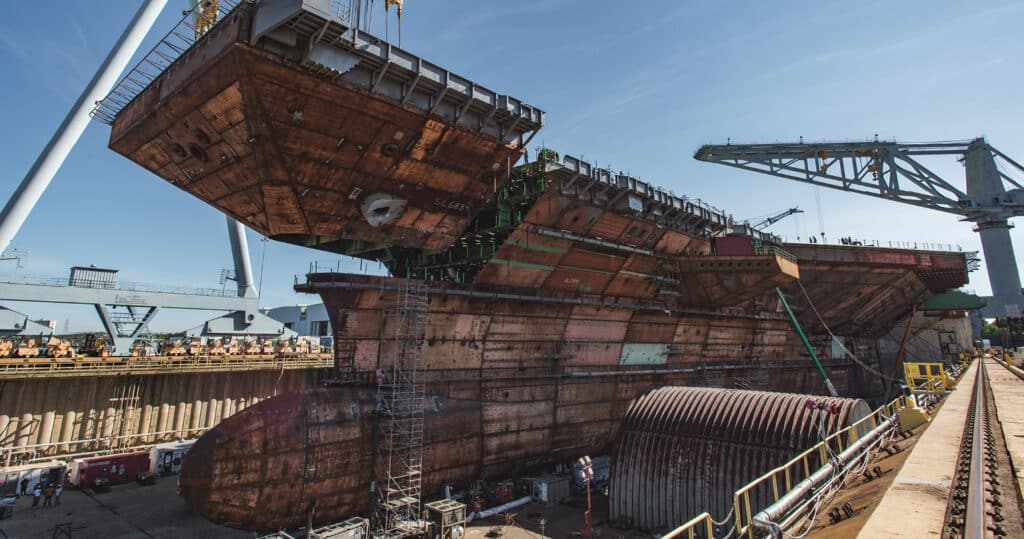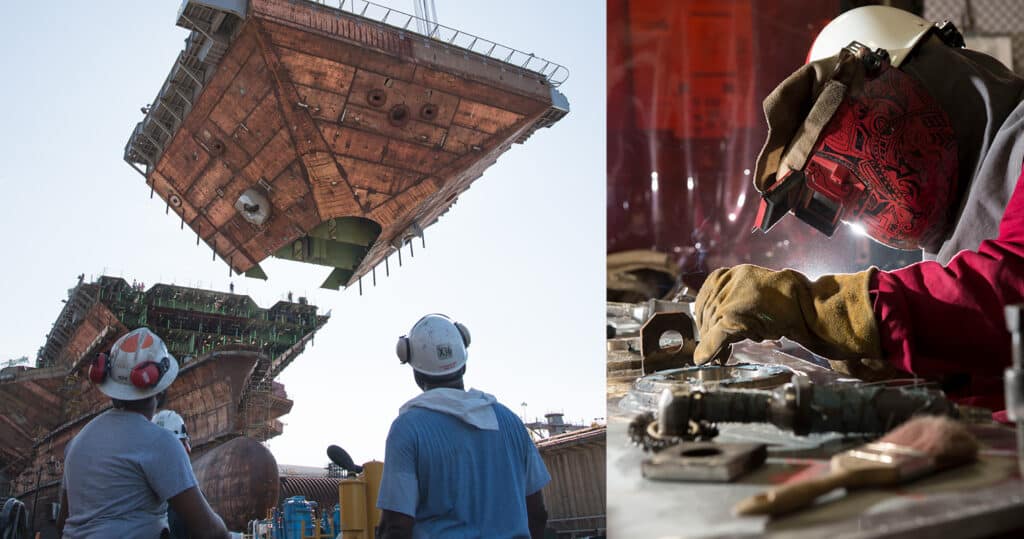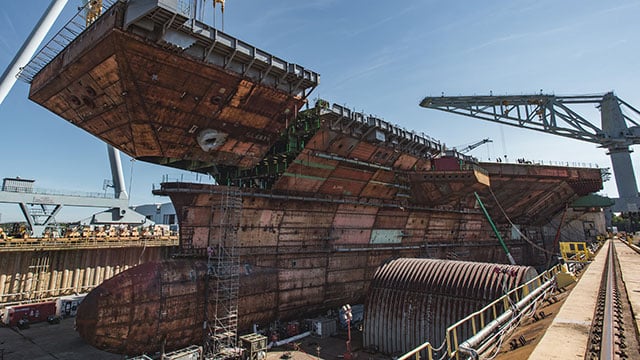USW Continues to Lead Drive to Rebuild Shipbuilding Industry
Once a powerhouse of industrial strength and a pillar of American economic and national security, the U.S. shipbuilding and maritime industry is now facing a dangerous decline after decades of neglect and strategic divestment policies.
As a result, hundreds of U.S. shipyards have shut down, tens of thousands of jobs in the supply chain have disappeared, and foreign powers, most notably China, have monopolized the global maritime sector using five-year plans and unfair trade practices.
The USW and other industry advocates have long called attention to the link between foreign shipbuilding influence and the erosion of U.S. jobs and economic growth.

Last year, the USW, along with several other unions, filed a Section 301 petition to hold China accountable for dominating this sector through their illegal, non-market practices, costing tens of thousands of jobs across the supply chain.
In response to this growing crisis, a bipartisan group of lawmakers initiated a piece of legislation intended to revitalize the United States’ shipbuilding infrastructure and restore maritime independence.
The Shipbuilding and Harbor Infrastructure for Prosperity and Security (SHIPS) for America Act, introduced by Senators Todd Young (R-IN.) and Mark Kelly (D-AZ.), aims to expand the U.S. international fleet, support maritime workforce development, and enhance competitiveness in the global market.
“By supporting shipbuilding, shipping, and workforce development, it will strengthen supply chains, reduce our reliance on foreign vessels, put Americans to work in good-paying jobs, and support the Navy and Coast Guard’s shipbuilding needs,” said Senator Kelly.
Today, the U.S. produces less than 1% of global commercial ships, whereas China is estimated to build nearly half. In the last 10 years – China has built 6,765 commercial ships, Japan has built 3,130 commercial ships, South Korea has built 2,405 commercial ships and in the US we have only produced 37 commercial ships.
The SHIPS for America Act marks the greatest federal commitment in years to rebuild America’s shipbuilding industry and secure its maritime future.
When implemented, the restoration of commercial ship building in the US will directly impact the supply chain that our members produce – steel, cables, boilers, pipes, fittings, pumps, glass, valves, engines, coatings and much more. Again supply chain materials all made by USW members.
A critical feature of the bill focuses on establishing a Strategic Commercial Fleet Program, which would require vessels to be built in U.S. shipyards, owned and operated under U.S. regulations, and meet military utility qualifications to support national defense needs.
This provision aims to add 250 new U.S.-flagged vessels to the international fleet over the next decade, leveraging stricter U.S. cargo preference rules to create a steady demand.
To further stimulate investment in rebuilding the U.S. commercial fleet, the policy also proposes introducing a 10% tariff surcharge to foreign-flagged commercial vessels importing cargo to United States ports.
Funding was another significant aspect of the bill. The legislation would establish a Maritime Security Trust Fund, a dedicated reserve of federal resources to support shipyard modernization, construction subsidies, and workforce development programs.
Backed by the USW and labor unions, these strategic investments will guarantee a sustained, long-term rebuilding and modernization of America’s maritime industry.

“This bill offers tangible incentives to the domestic maritime industry with the goal of expanding the U.S. flag ocean-going fleet,” said David Kim, CEO of the Hanwha Philly Shipyard.
The SHIPS for America Act commits to strengthening the American workforce by expanding access to GI Bill benefits and Public Service Loan Forgiveness for mariners and shipyard workers. It updates training systems while promoting maritime academies and skilled trades education.
This legislation addresses ongoing labor shortages and creates pathways to good-paying, union-supported careers for a new generation of workers. A skilled workforce is essential for economic growth and national security.
To ensure strong federal leadership, the SHIPS Act establishes a White House Maritime Security Advisor and a Maritime Security Board. This new framework aligns strategy across key agencies, including the Department of Defense, Department of Transportation, and Maritime Administration.
Economic and security interests have been considered separately in maritime policy for too long. This legislation amends that by streamlining collaboration and creating a unified approach. For the USW and other advocates, the SHIPS for America Act answers years of calls to restore U.S. maritime leadership through direct investment, fair trade enforcement, and worker-centered policy. It is a critical step forward for the future of American industry.
By clicking Sign Up you're confirming that you agree with our Terms and Conditions.
Recent News Articles
Want to Learn More?
See how the USW is making a real difference in our communities and our workplaces.

